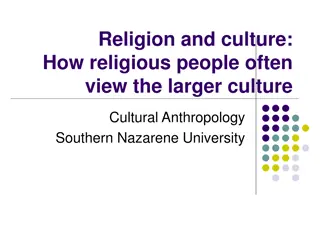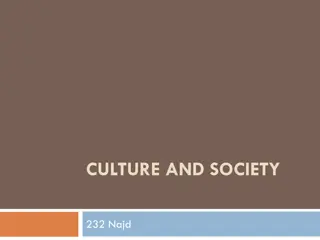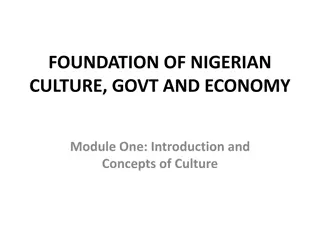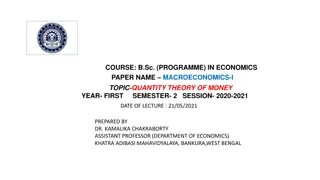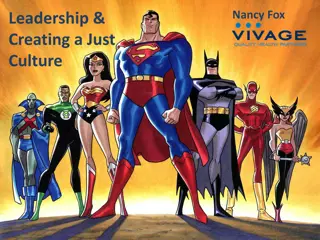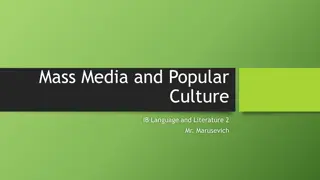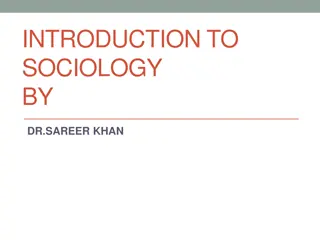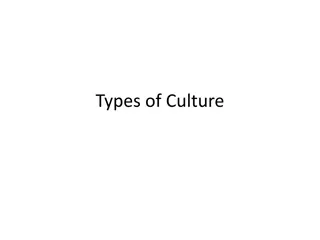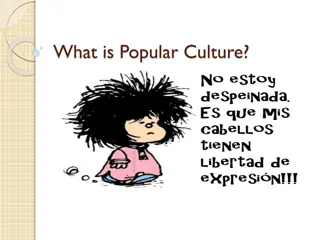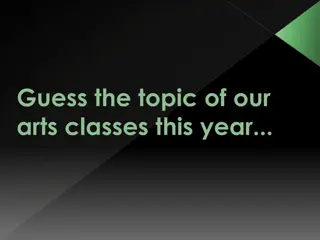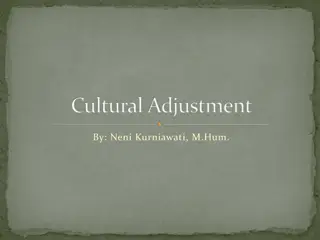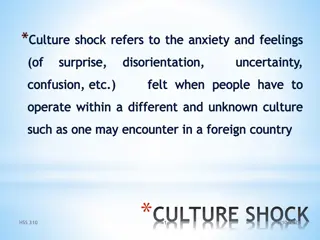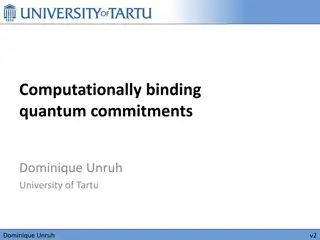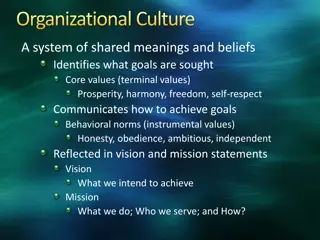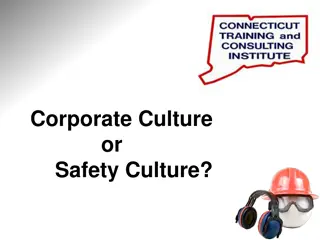Understanding Popular Culture: Definitions and Perspectives
Popular culture encompasses artistic and intellectual products, lived practices, and ideologies within society. It can be defined in various ways, reflecting what is widely liked and created by the people. This cultural phenomenon is shaped by power dynamics, social realities, and distinctions from high culture. Exploring the relationship between popular culture and ideology reveals complex intersections of art, society, and the everyday.
Download Presentation

Please find below an Image/Link to download the presentation.
The content on the website is provided AS IS for your information and personal use only. It may not be sold, licensed, or shared on other websites without obtaining consent from the author. Download presentation by click this link. If you encounter any issues during the download, it is possible that the publisher has removed the file from their server.
E N D
Presentation Transcript
What is Culture? Raymond Williams (1983) Culture refers to: A general process of intellectual, spiritual and aesthetic development i.e. Western Culture A particular way of life: whether of a people, period or group i.e. Pastimes/habits/religious rituals etc. The works and practices of intellectual and especially artistic activity i.e. Ballet, movies, novels. Signifying Practices
Culture Contd Popular culture focuses on the second and third definitions. It relates to lived practices of a society or group And it relates to the artistic/intellectual products of that society.
Ideology 5 ways of understanding ideology: A body of ideas articulated by a group (professions, political parties) A means of distorting of social realities Images of reality as presented in art Fixing connotations to present as natural and general what is particular and man-made. Rituals and actions that connect us to the social order (Althusser) Culture is marked by ideology and issues of power and politics. And vice-versa.
Six Definitions of Popular Culture Any definition of popular culture invokes multiple connotations of popular as well as culture: Well liked by many people , inferior kinds of work made to appeal to people made by the people themselves (Williams 1983)
Popular culture can refer to any culture which appeals to a large group of people, quantifiable through number of sales, downloads etc. However any cultural artifact can sell large numbers. Does this alone determine it as popular ? Why or Why not?
Popular Culture can also refer to what remains after a society distinguishes what is high culture. Popular Culture is then categorized as inferior Society sets qualifications for high culture such as complexity realism etc. P.C. Is what fails . Pierre Bourdieu: Distinctions of culture often follow distinctions of class. Complex works require greater investment of time and money.
The denial of lower, coarse, vulgar, venal, servile in a word, natural enjoyment, which constitutes the sacred sphere of culture, implies an affirmation of the superiority of those who can be satisfied with the sublimated, refined, disinterested, gratuitous, distinguished pleasures forever closed to the profane. That is why art and cultural consumption are predisposed, consciously and deliberately or not, to fulfil a social function of legitimating social differences. Pierre Bourdieu Distinction: A Social Critique of the Judgment of Taste.
Popular Culture is also defined as mass culture: Mass-produced for mass-consumption Is formulaic and politically manipulative (Die Hard, Avatar) Is hopelessly commercial Audiences are passive consumers rather than active readers. It is imposed by corporations/government Is American/Americanized This implies the existence of an other culture, a non- alienated, organic culture or golden age which P.C. is a corruption. What is the problem with this view? Also does this not imply that consumers of P.C. are dupes of the system who need to be woken up by the intelligentsia/culture makers?
Popular Culture can refer to culture produced by the people. (Urban/Folk culture) However, is it always produced this way? Where do the images and tropes that make up folk culture and urban culture come from?
Popular Culture can refer to the terrain of struggle between the forces of resistance and incorporation Based on Antonio Gramsci s theory. Hegemony refers to the way in which the powerful lead by earning consent rather than controlling society through force alone.
Gramsci In Gramsci s view, the dominant classes develop a hegemonic culture that propagates its own values as common sense . Intellectuals and artists can act as agents for the hegemonic culture, or for a culture of resistance. Is hegemony still a reality? What is the hegemonic culture in the west in 2015?
In the Neo-Gramscian definition, Popular Culture is neither imposed from above , nor emerges from below but rather is a terrain of exchange and negotiation between dominant and subordinate groups. This explains the fluidity of P.C. How oppositional cultural elements can be appropriated by dominant groups, (Record companies making millions on Anti-corporate bands, Che Guevara T- shirts) And also how elements of high culture become popularized. (The Nutcracker in ads, opera movies)
Finally, P.C. is associated with postmodernism. Postmodern culture no longer recognizes arbitrary taste divisions. The left is annoyed, because everything is brought together under the umbrella of commercialism. ( My friend the Communist/holds meetings in his RV/I can t afford his gas/So I m stuck here watching TV) The right is annoyed because it still recognizes high culture and low-culture distinctions.
All concepts of popular culture are haunted by a present/absent other . This other determines how P.C. will be theorized (as failure? as resistance? as native? as folk?) There are a multitude of approaches one can take to P.C. And you have many to choose from.
Questions for discussion Do you think that the terms culture and popular culture are easy to fix or define? Why or why not? How does Storey approach the question of definition? In the section on ideology, Storey concludes by suggesting that relations of power and politics inescapably mark the culture . Do you agree with this statement? Is there a such thing as an apolitical or ideologically neutral cultural product? What is your opinion on the distinction between high culture and popular culture ? Is the distinction merely a product of class, as Bourdieu suggests, or are there qualitative differences between high culture and popular culture ? How does postmodernism affect the high culture/popular culture divide? What are some of the pros and cons of this development?
Popular Culture activity In groups of three, brainstorm a list of 5-7 popular art forms you have experienced recently (albums, movies, TV series, books, social media creations etc.), then for each one discuss critically how it is marked by relationships of power and politics. Consider things such as the presence or absence of ideological perspectives, its relationship to marketing, its role as conciliatory or opposition to the hegemonic culture, representation of certain groups (women, racial groups, etc.) and use of tropes. What are some of the tensions, or internal paradoxes of the work. And what does it indicate about the society in which it emerged?


